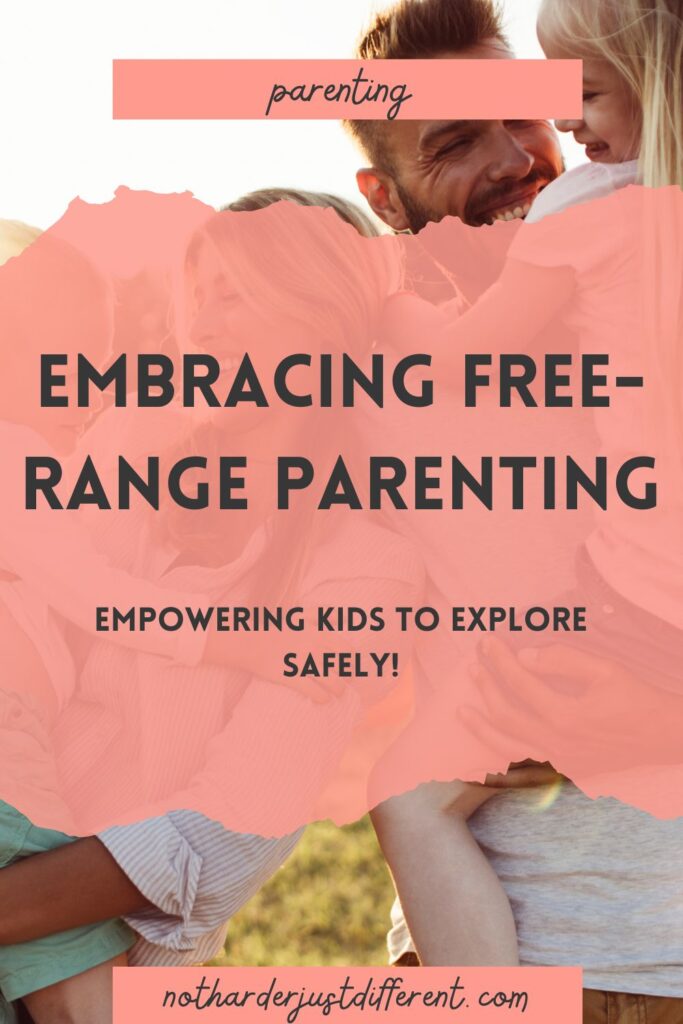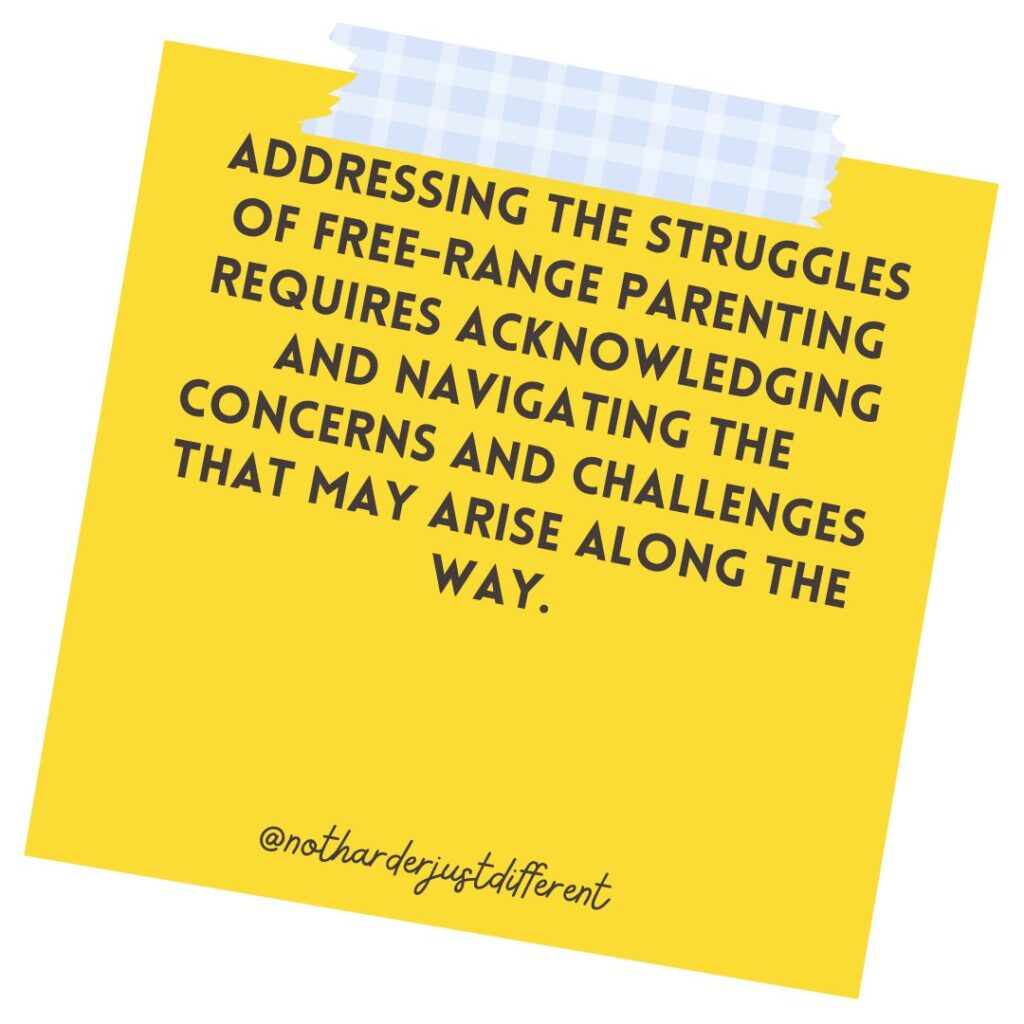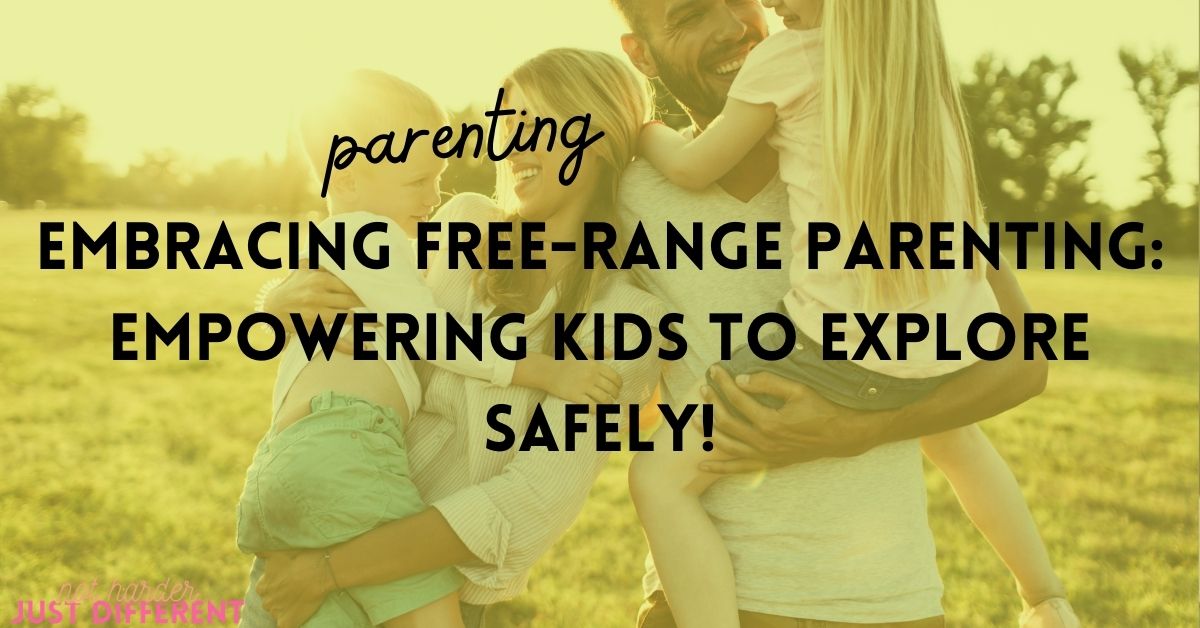Disclaimer: As a future Licensed Clinical Social Worker (LCSW) currently pursuing my master’s degree, I am passionate about sharing insights and information related to parenting, autism and homeschooling based on my personal experiences and research. However, the content shared on this blog is not intended to substitute professional advice, diagnosis, or treatment. Parenting is a deeply personal journey, and while I strive to provide valuable insights, every family and situation is unique. Readers are encouraged to consult with qualified professionals for personalized guidance tailored to their specific needs and circumstances.
Have you ever heard of free-range parenting? It’s not about chickens roaming in the backyard (although that can be fun too!). Instead, it’s a parenting philosophy that encourages kids to explore the world around them independently, with appropriate guidance and boundaries, of course.
Imagine this: your child riding their bike around the neighborhood, climbing trees, and making friends with the neighbors’ kids. That’s the essence of free-range parenting—fostering independence while keeping safety in mind. Intrigued? Let’s chat about what free-range parenting is all about!
So, what exactly is free-range parenting, you ask? Well, it’s all about giving our kids the freedom to explore, learn, and grow on their own terms, within safe boundaries. It’s about empowering them to make choices, take risks, and develop important life skills like problem-solving and decision-making. Think of it as giving them the wings to fly while ensuring they have a safety net to catch them if they fall. Sounds pretty awesome, right? But before you unleash your little explorers into the wild, let’s chat about what free-range parenting looks like in practice and how you can implement it in your own family.

Free-Range Parenting, In Real Life!
Understanding Free-Range Parenting
Understanding Free-Range Parenting involves embracing a mindset that prioritizes independence and exploration within safe boundaries. Unlike helicopter parenting, which hovers over every move a child makes, free-range parenting encourages children to take age-appropriate risks and learn from their experiences. It’s about striking a balance between freedom and responsibility, allowing kids to develop essential life skills like problem-solving, resilience, and self-reliance. Essentially, free-range parenting acknowledges that children are naturally curious and adventurous beings who thrive when given the opportunity to explore and discover the world around them.
At its core, free-range parenting emphasizes trust in our children’s abilities and judgment, empowering them to make decisions and navigate challenges with confidence. It encourages parents to step back and allow their children to take the lead in their own adventures, whether it’s walking to school alone, riding their bikes to the park, or exploring nature trails with friends. By fostering independence and autonomy from a young age, free-range parenting sets the stage for children to develop a strong sense of self and agency, laying the groundwork for success both now and in the future.
Benefits of Free-Range Parenting
Free-Range Parenting opens up a world of opportunities for children to develop essential life skills and thrive in various aspects of their lives. One significant benefit is the cultivation of independence and self-reliance. By allowing children the freedom to explore their surroundings, make choices, and solve problems independently, free-range parenting fosters a sense of confidence and autonomy that will serve them well throughout their lives. Moreover, children learn to take responsibility for their actions and decisions, empowering them to become resilient and resourceful individuals capable of navigating life’s challenges with grace and resilience.
Another noteworthy benefit of free-range parenting is the promotion of creativity and curiosity. When children are given the freedom to explore and discover the world around them, they naturally become more curious about their surroundings, sparking their imagination and creativity. Whether it’s building forts in the backyard, exploring nature trails, or inventing games with friends, free-range parenting encourages children to think outside the box, explore new ideas, and express themselves creatively. This sense of exploration and curiosity not only enriches their childhood experiences but also lays the foundation for a lifelong love of learning and discovery.

Struggles of Free-Range Parenting
Addressing the struggles of Free-Range Parenting requires acknowledging and navigating the concerns and challenges that may arise along the way. One common struggle parents may encounter is striking the right balance between freedom and safety. While free-range parenting encourages independence, ensuring that children are equipped with the necessary safety knowledge and skills to navigate their surroundings is essential. Parents may find themselves grappling with how much freedom to grant their children while still prioritizing their well-being and safety in an unpredictable world.
Additionally, societal norms and perceptions can present challenges for parents practicing free-range parenting. In a culture that often prioritizes overprotection and constant supervision, parents may face judgment or criticism from others who may not understand or agree with their approach. Navigating these external pressures while staying true to one’s parenting values and beliefs can be a significant struggle for many families. Moreover, as children grow and develop, their evolving abilities and interests may pose new challenges for parents in ensuring that they are adequately prepared and supported in their independent explorations. Balancing the desire to foster independence with the need to provide guidance and support can be an ongoing struggle for parents practicing free-range parenting.
Navigating Challenges and Critics
Navigating Challenges and Critics of free-range parenting can be a daunting task, especially in a society that often emphasizes safety and supervision above all else. One of the main challenges parents may face is the fear of judgment from others who may not understand or agree with the free-range approach. Critics may express concerns about safety, citing potential risks and dangers associated with allowing children more freedom and independence. Addressing these concerns involves open communication and education, explaining the principles and benefits of free-range parenting while also emphasizing the importance of safety measures and responsible decision-making.
Another challenge parents may encounter is navigating their own fears and anxieties about allowing their children more independence. It’s natural for parents to worry about their children’s safety, but it’s essential to strike a balance between protecting them and allowing them to grow and learn through experiences. By gradually expanding boundaries and gradually increasing independence based on a child’s maturity and readiness, parents can help alleviate their own anxieties while empowering their children to explore the world around them safely. Ultimately, navigating challenges and critics of free-range parenting requires a combination of confidence, communication, and trust in both our children’s abilities and our own instincts as parents.
Tips for Safe and Successful Exploration
- Start with small steps, gradually increasing your child’s independence as they demonstrate readiness.
- Teach your child safety rules for navigating their environment, including road safety and stranger danger.
- Set clear boundaries and expectations for your child’s outings and activities.
- Equip your child with essential skills such as how to use a map, navigate public transportation, and make emergency calls.
- Encourage open communication with your child, allowing them to express their concerns and ask questions.
- Establish designated safe zones where your child can play and explore freely.
- Practice risk assessment together, discussing potential hazards and how to avoid them.
- Foster a sense of responsibility by involving your child in decision-making and problem-solving.
- Allow your child to experience natural consequences for their actions, providing guidance and support as needed.
- Create opportunities for unstructured play and exploration in nature.
- Encourage your child to make new friends and interact with peers in supervised settings.
- Model positive behaviors and attitudes towards risk-taking and independence.
- Stay informed about your community’s resources and amenities that support free-range parenting, such as parks and recreational facilities.
- Build a network of trusted adults, such as neighbors and family friends, who can provide support and supervision when needed.
- Emphasize the importance of teamwork and cooperation, encouraging your child to collaborate with others in group activities.
- Teach your child basic first aid skills and what to do in case of emergencies.
- Foster a sense of resilience by encouraging your child to persevere in the face of challenges.
- Provide opportunities for your child to take on age-appropriate responsibilities at home and in the community.
- Celebrate your child’s achievements and milestones, recognizing their growth and development.
- Trust your instincts as a parent and be willing to adapt your approach based on your child’s individual needs and circumstances.
Embracing free-range parenting offers a unique opportunity for children to develop independence, resilience, and curiosity in a supportive and nurturing environment. While challenges and struggles may arise along the way, the benefits of free-range parenting far outweigh the risks, empowering children to explore and discover the world around them with confidence and enthusiasm. By fostering open communication, setting clear boundaries, and prioritizing safety, parents can navigate the complexities of free-range parenting while instilling valuable life skills and values in their children. Ultimately, free-range parenting is not just about giving children the freedom to roam—it’s about equipping them with the tools and confidence they need to navigate life’s adventures with courage and grace.

